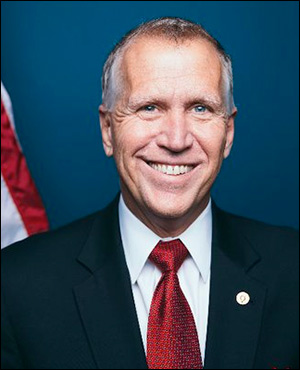
North Carolina Sen. Thom Tillis (R)
Oct. 16, 2019 — A new Meredith College political survey (Sept. 29-Oct. 7; 998 registered North Carolina voters) shows electoral weakness for Sen. Thom Tillis (R) as he seeks a second term next year.
The poll places the first-term US senator in a statistical tie with both of his potential Democratic opponents, state Sen. Erika Smith (D-Gaston) and former state Sen. Cal Cunningham. The large number of uncommitted voters, however, suggests the race could go to either party and will likely break late, similar to many previous North Carolina election results.
According to the Meredith data, Sen. Tillis would tie both Smith and Cunningham with each of the three candidates receiving 33 percent support in all pairings. Obviously, these are not particularly favorable numbers for any incumbent and must be taken more seriously in this instance because of North Carolina’s history of either defeating its senators or seeing them not serve a second term for another reason.
In fact, the only two Tar Heel senators who have been re-elected since 1974 are Jesse Helms (R) and current three-term incumbent Richard Burr (R). During that span, the following senators were no longer in office after one term:
ONE-TERM NORTH CAROLINA SENATORS
- Robert Morgan (D), 1980 – lost re-election
- John East (R), 1986 – committed suicide in June before seeking a second term
- Jim Broyhill (R), 1986 – appointed to fill Sen. East’s term; lost 1986 election)
- Terry Sanford (D), 1992 – lost re-election
- Lauch Faircloth (R), 1998 – lost re-election
- John Edwards (D), 2004 – did not seek a second term to instead run for president
- Elizabeth Dole (R), 2008 – lost re-election
- Kay Hagan (D), 2014 – lost re-election
The Meredith College pollsters also tested Gov. Roy Cooper (D) as he fights for a second term likely against Lt. Gov. Dan Forest (R). Here, Meredith finds the incumbent holding a 46-33 percent margin over his eventual GOP challenger.
During that same time interval where incumbent senators were consistently losing re-election, the North Carolina electorate only turned out one governor, Pat McCrory (R) in 2016, by just two-tenths of one percent. North Carolina only began allowing governors to serve a second term in 1980.
The Meredith survey sample was weighted to bring the respondent cell demographics back into line with the statewide actual numbers. For example, the polling sample contained 55.7 percent women, but the actual census report finds the North Carolina female population at 51.4%. This characteristic, unweighted, would favor the Democrats.
The partisan division, however, would slightly favor the Republicans had the response units not been placed into balance with the actual numbers. According to the latest state voter registration statistics, Democrats hold 36.8 percent of the NC voting universe, Republicans 30.0 percent, and Unaffiliateds 32.5 percent. The Meredith survey listed the sample as 33.0 percent Republican, 32.1 percent Democratic, and 30.4 percent Unaffiliated.
As is the case around the country, the “Right Track/Wrong Track” question is producing unusual results. Normally, in a good economy, the Right Track answer does well. Currently, we are seeing a prevalent US Wrong Track majority response while the state Right Track/Wrong Track percentages are consistently better. This Meredith North Carolina poll fails to change the trend.
Here, respondents rate the direction of the country, referred to as “satisfied” or “dissatisfied,” at 35:60 percent negative. This is contrasted to a 43:47 percent wrong track response in reference to the state of affairs within North Carolina.
Despite the strong economy, partisan answers appear to dominate here and around the country. By a margin of 17:78 percent Democrats say the country is on the wrong track. Republicans, on the other hand, believe in a 58:37 percent ratio that America is on the right track. Independents move closer to the Democratic position with a 29:67 percent split answering “dissatisfied.”
In addition to partisanship, Independents often respond “wrong track” to reflect their negative feelings about Congress not passing constructive legislation to solve problems, whereas most of the Democratic and Republican responses reflect their feelings about President Trump.
The Meredith College poll again projects that North Carolina will host a close 2020 election result, just as the state has in virtually every election of this century. And Tar Heel voters will again play a key role in ultimately determining who serves in the White House beginning in 2021.
